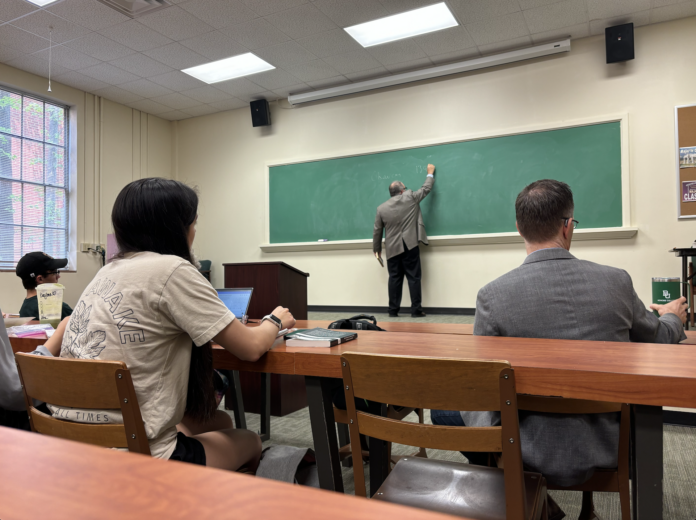
Reporter Caitlin Beebe
The 2024 presidential election is right around the corner, and students have the opportunity to study elections in real time in PSC 3340, a class on campaigns and elections.
Dr. Dave Bridge, associate professor of political science, said the class focuses on the systems, rules and history of elections. When Bridge taught this class during the 2020 presidential campaign, about 250 students enrolled.
“We spent a lot of time trying to figure out what was happening in real time,” Bridge said. “The day after the incident, we all woke up. [2020 presidential] An election where you don't know who won. ”
Bridge said he sees hyper-partisanship as a growing problem as he looks ahead to the 2024 election. Bridge said this happens when people derive their beliefs from a party's platform rather than their personal beliefs.
“There's an immense trust that the other party should always be right, and a deep distrust that everything the other party does is wrong,” Bridge said.
Mr. Bridge said that while polarization has increased over the past 30 years, partisan escalation over the past decade has led to a lack of trust in government processes and a loss of ethics.
In response, Bridge said he emphasizes that students think institutionally rather than politically. The difference lies in whether you are willing to lose an election.
Bridge said thinking politically means prioritizing winning elections above all else.
“[It’s] “It's as if winning this particular election, regardless of the means, is more important than protecting our constitutional democracy,” Bridge said.
In contrast, Bridge said thinking institutionally means considering the constitutional impact of your decisions.
“When you think institutionally, you're acting within the rules and processes of the Constitution,” Bridge said. “It's more important that the U.S. Constitution survives than winning this election.”
Sage Yassa, a senior from Plano, took Bridge's class in 2020. Yassa studies how Supreme Court decisions and the impeachment process are co-opted into political tools.
“I hope we can find a way to get back to using these.” [institutions] “We're focusing on how it's used, not just as an automatic tool to fight the other side,” Yassa said.
Yassa said large amounts of social media data is an issue that will be raised in the 2024 election. Both parties are likely to rely on activity data since social media played a pivotal role in the 2012 election, Yassa said. Candidates are less likely to engage directly with voters or consider what is best for America.
“I think it definitely becomes less personal and less caring,” Yassa said.
Bridge said the 2024 election will provide insight into how political parties balance big data and personalized messaging.
In the fall, Bridge said she wasn't worried about disagreements in her class getting out of hand.
“Baylor students are the most tolerant of anyone I have ever taught,” Bridge said. “That means they really want to listen to people who disagree with them. They encourage others to speak their mind.”
Yassa said professors lead by example when it comes to disagreements. She said professors always speak respectfully to all candidates during class discussions.
“We also have professors in political science who encourage nuanced thinking.[ing] It goes beyond the bucket that I put in myself,” Yassa said.
Yassa said bridge classes help provide historical context for young people. Learning history makes you less upset by new information and situations.
“This course creates a person who believes that American democracy is dead and does not respond to any information,” Yassa said. “There's no need for that.”
Yassa said she encourages students of all classifications to consider taking bridge classes. She said having the opportunity to do so was one of the reasons she chose to attend Baylor.
“Freshmen don't have to be scared. Sophomores don't have to be scared. And juniors and seniors, even though they've taken quite a few political science classes, feel like this class is different. It might be refreshing when I finish my undergraduate career,” Yassa said.

